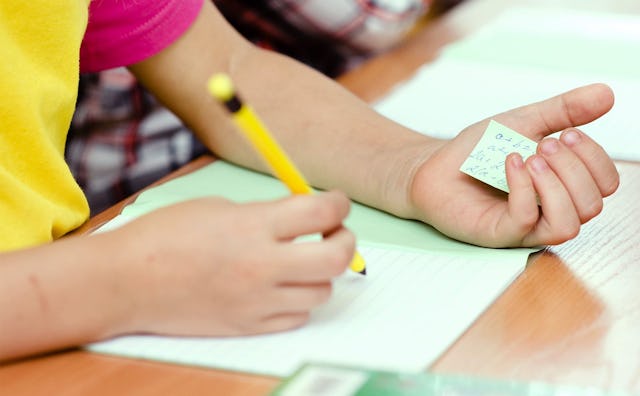When A Good Girl Breaks Bad

This was not a sustainable lifestyle. At some point, I was going to crack. Maybe not sell crack, but still. Being so good started feeling pretty bad.
© Courtesy Liza Wyles
I was no longer remarkable for being good. I was just me. I had to start besting myself to get an ounce of praise. It was exhausting. Meanwhile, my third grade peers who were regularly sent to the principal’s office were getting lauded for the most menial tasks. “You stayed in your seat this morning, great job!” Hey, I’ve been staying in my seat for eight years!
It got to the point where, in middle school, a piece of fiction I wrote, for extra credit, was published in a national children’s literary magazine, but the Eighth Grade Writing Award was given to Daniel L., who simply liked writing. “Well,” the school seemed to shrug, “You’ve always liked writing.” I see. I was just being me. Nothing special. If you’re always good, you fade into the white noise of the day. Just another part of the machine humming along.
So I decided to break bad.
Drugs were not what I had in mind. They wouldn’t be bad enough—not when your ex-hippie parents had informed you that you could try any drug you like, the only caveat being that you’d have to do it in front of them. Message received. I’d be bad some other way.
In my freshman year of high school, I found myself among an entire population of good kids. And I was faced with a choice: separate myself from the pack by being even better, or by being only slightly less good. The former spelled out hours of community service and participation in clubs with names that only looked good on college transcripts, or on hipster T-shirts. The latter was a dare. I took it.
© Courtesy Liza Wyles
One night in ninth grade, I failed to do my English homework. I just never got around to it. I was an over-scheduled kid (you know those good types, always racking up extracurricular activities to impress the future Ivy League admissions officers) and had simply fallen asleep before reading a particular act of Hamlet. Of course in class the next day, it was announced that homework was being collected, and so I begged my very good girlfriend sitting next to me to let me copy hers. I could see the conflict in her eyes. Did being good mean doing the right thing (denying me her homework to copy), or did it mean helping me out as a friend? She chose the latter, and I quickly paraphrased her answers, copying the gist of her ideas but putting it into my own words. I got it down just as it was my turn to add my homework to the pile being passed around the class to the teacher.
Imagine my horror when we learned the homework was to be graded.
Now imagine her horror when mine was returned with a higher grade than hers.
Even when I was bad, I was good.
It was a weird lesson, to get away with something I wasn’t supposed to. To cheat, and not only not get caught, but win. Sure, I felt smug about it. “I got this” was what I would have probably told myself if that catchphrase existed in 1987. But it didn’t feel that good. It wasn’t very rewarding. And while I could fudge my way through copying English homework, there were just going to be some things I could never be good at. Physics. Returning phone calls. Left-lane merging. But those shortcomings didn’t change who I was. They just added some colorful punctuation to the proper grammar of my life.
So as I’m raising my own firstborn, Type A daughter, I will encourage her to be the best she can be. But sometimes, it will suffice to just be OK. And if she’s excited by the dare, and nobody will get addicted or shot, she should experiment a little with breaking bad.
But just be really, really good at it.
This article was originally published on